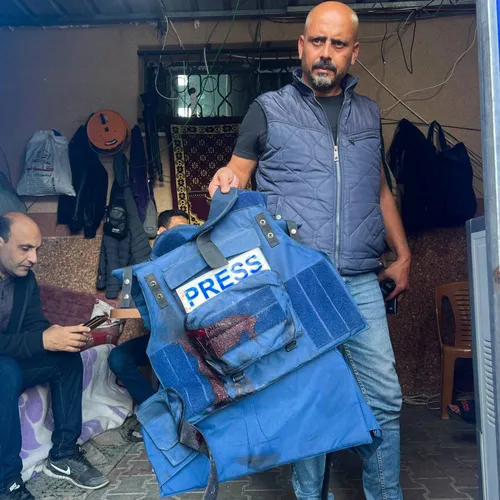
Amid a visit to Israel by a US government envoy, who has been pushing for the offensive in Gaza to find ways to spare the lives of innocent civilians, the Israeli massacre in the Gaza Strip took the lives of two more journalists this Friday on Friday (15), which brought to 64 the number of media professionals killed since the start of the war.
The total number of victims on the Palestinian side is now close to 19,000 and suspicions have increased that troops from the invading country maintain a deliberate policy of trying to make the work of those dedicated to reporting the ongoing aggression impossible.
Samer Abudaqa, from the broadcaster Al Jazeeraand Ramy Budair, from the agency Palestinian New Press, are the fatal victims of the day in the city of Khan Younis, in southern Gaza. But the Israeli attack also left a number of injured people, including the head of Al Jazeera’s editorial office in Gaza, Wael Dahdouh, who gave details about what happened.
Wael Dahdouh in the hospital bed, shortly after the attack: after losing several relatives in an Israeli attack, this time he was the victim. But he survived / AFP
Dahdouh said the broadcaster’s team was accompanying rescuers as they evacuated a family after the destruction of their home. “We captured the devastating destruction and reached places that had not been reached by any camera lens since the start of the Israeli ground operation,” she said, from a hospital bed.
As journalists left the scene on foot, Dahdouh said “something big” knocked him to the ground. After the explosion, he pressed his wounds and left the scene to seek help, but when he reached an ambulance, rescuers said they could not return to the scene of the attack because it was too dangerous.
According to him, an ambulance tried to reach Abudaqa, but was shot at, which appears to be yet another case, among many others reported in recent days, in which injured innocent civilians are unable to obtain adequate medical care because Israeli forces disrupt the rescue work.
Statistics
Dahdouh lost several members of his family (wife, son, daughter and grandson) in an Israeli airstrike in October. According to the Committee to Protect Journalists (CPJ), journalists in Gaza face particularly high risks when covering the Israeli invasion, which come from devastating airstrikes, disrupted communications, supply shortages and power cuts, not to mention multiple attacks, threats, cyberattacks, censorship and murders of journalists’ families.
Check out the numbers referring to media professionals up to December 15th: 64 dead (57 Palestinians, 4 Israelis and 3 Lebanese); 13 injured; 3 missing; 19 arrested.
CPJ called for an independent investigation into Friday’s attack. Carlos Martinez de la Serna, the organization’s director, said he was alarmed by “the pattern of attacks on Al Jazeera journalists and their families.”
In total, at least 18,787 people have been killed in Gaza and 50,897 injured since the start of the war, according to the Gaza Ministry of Health.

Less than two months ago, Dahdouh (center) watched over his family and other victims of an Israeli attack: the massacre continues / Mahmud HAMS / AFP – 26/10/2023
Premeditated deaths?
On October 27, 20 days after the start of Israel’s offensive, the Reuters and France Press news agencies sought assurances from the Israel Defense Forces (IDF) that their journalists would not be targeted, and heard that it would be impossible to guarantee their safety.
Recently, Al Jazeera claims to have asked US National Security Council spokesman John Kirby whether Israel was deliberately targeting journalists, which he denied: “I have seen no indication of that, absolutely no evidence that Israel is going behind journalists. It is an unfounded allegation.”
Repercussion
Tim Dawson, deputy secretary-general of the International Federation of Journalists, sounded the alarm over the “dozens of journalists” killed since October 7. “I believe this is now a press freedom issue. We have to ask ourselves, ‘What does the [militar israelense] Are you trying to achieve? Why don’t they allow foreign journalists in?'” he told Al Jazeera.
Stephane Dujarric, spokesman for UN Secretary-General António Guterres, said: “It is crucial that journalists can carry out their work without violent attacks.”
Israel admits to having killed hostages by mistake
Amid the commotion caused by the deaths of the journalists, the Israeli army admitted that it mistakenly killed three people taken hostage by Hamas in the invasion of Israel on October 7th. According to spokesman Daniel Hagari, the army “wrongly identified three Israeli hostages as a threat” during fighting in Gaza City.
“During a sweep and inspection of the incident area, a suspicion arose regarding the identity of the dead. The bodies were taken for examination on Israeli territory, after which it became clear that they were three Israeli hostages,” he said. The names of two of them were released and the third remained confidential, at the family’s request.
Impressions of Biden’s envoy
White House national security adviser Jake Sullivan, who is in Tel Aviv, said on Friday that Israel’s war, which is reportedly against Hamas, “is going to take months.” He said he discussed with Israeli leaders plans to transition from the “high-intensity phase” of the Gaza offensive to “more targeted operations.” He did not specify a timeline for the supposed transition, but said his country wants to “see the results.”
After declaring full support for Israel at the beginning of the offensive, including sending military and financial resources, President Joe Biden’s government has adopted a more critical stance in recent times, stating that Israel needs to spare civilians and that its historic ally is losing support in the international community because of the massacre in Gaza.
New humanitarian crossing
Israel announced on Friday that it will temporarily open the Keren Shalom crossing so that some humanitarian aid deliveries can pass directly from Israel to Gaza without having to enter Gaza through the city of Rafah, where there is a bottleneck, a limitation in the ability to promote this humanitarian corridor. It is the first time since the beginning of the offensive that humanitarian aid will be able to pass directly between Israel and Gaza.
With information from Al Jazeera and Washington Post.
Editing: Rebeca Cavalcante

Source: www.brasildefato.com.br

